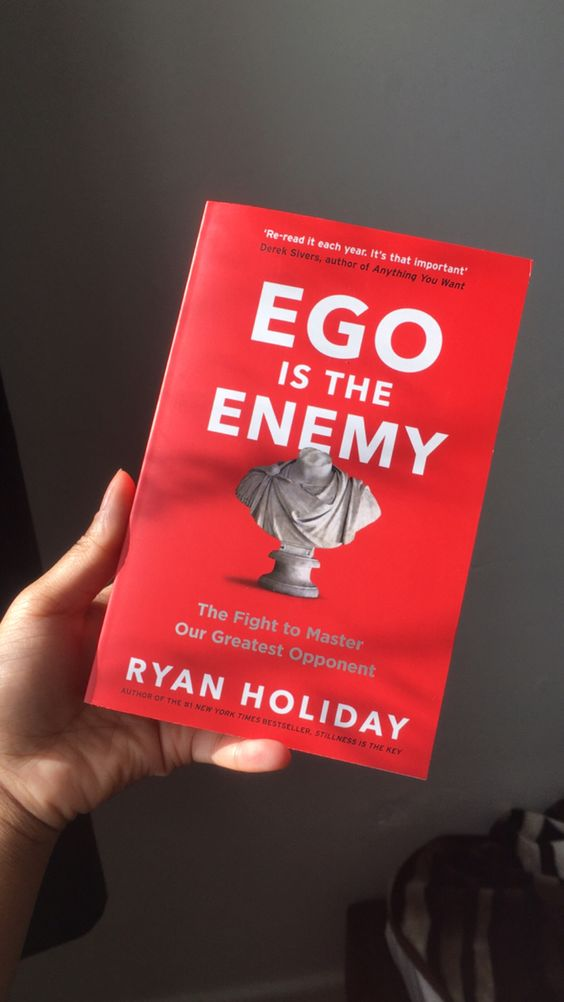Introduction
"Ego is the Enemy" by Ryan Holiday is a profound exploration of how our own egos can obstruct our path to success and fulfillment. Drawing on historical examples and philosophical insights, Holiday delves into the detrimental effects of ego and offers practical advice for overcoming it. This book is a compelling guide for anyone seeking personal and professional growth, emphasizing humility, resilience, and continuous self-improvement.
The Premise of "Ego is the Enemy"
The central premise of "Ego is the Enemy" is that ego, defined as an unhealthy belief in our own importance, is the root of many personal and professional problems. Ego can blind us to our faults, lead us to overestimate our abilities, and drive us to make decisions that are not in our best interest. By recognizing and managing our ego, we can achieve true greatness and fulfillment.
Key Themes and Concepts
1. Aspire: Overcoming Ego in Ambition
Holiday begins by addressing the role of ego in ambition. He argues that while ambition is essential for achieving goals, an unchecked ego can turn ambition into arrogance. Key strategies for overcoming ego in this phase include:
- Staying Humble: Emphasizing humility and recognizing that there is always more to learn.
- Continuous Learning: Seeking knowledge and skills from others and being open to feedback.
- Focus on the Work: Prioritizing the work itself rather than the accolades or recognition that might come with it.
2. Success: Maintaining Humility Amidst Achievement
Success often brings a heightened risk of ego inflation. Holiday discusses how ego can lead to complacency, entitlement, and poor decision-making during periods of success. Strategies to manage ego during success include:
- Maintaining a Beginner's Mindset: Approaching each task with the curiosity and openness of a beginner, regardless of past successes.
- Seeking Honest Feedback: Surrounding oneself with people who provide constructive criticism and honest feedback.
- Avoiding Complacency: Continuously challenging oneself and setting new goals to stay grounded and focused.
3. Failure: Resilience in the Face of Adversity
Failure can either deflate or inflate the ego, depending on how we respond to it. Holiday emphasizes the importance of viewing failure as a learning opportunity rather than a personal affront. Key points include:
- Embracing Failure: Accepting failure as a natural part of the journey and using it as a stepping stone to improvement.
- Learning from Mistakes: Analyzing failures to understand what went wrong and how to avoid similar pitfalls in the future.
- Perseverance: Cultivating resilience and the determination to keep going despite setbacks.
Historical Examples and Philosophical Insights
Holiday draws on a wide range of historical examples to illustrate his points, including:
- Howard Hughes: An example of how unchecked ego can lead to personal and professional downfall.
- Katharine Graham: Her journey of humility and learning as she led The Washington Post to success.
- Bill Belichick: Known for his focus on the work and continuous improvement, avoiding the traps of ego even in success.
These examples provide tangible evidence of the impact of ego on various aspects of life and highlight the benefits of humility and self-awareness.
Practical Advice for Overcoming Ego
Holiday offers practical strategies for managing and overcoming ego:
- Practice Humility: Regularly remind yourself of your limitations and the contributions of others.
- Cultivate Self-Awareness: Reflect on your actions and motivations to understand where ego might be influencing your decisions.
- Seek Mentorship: Find mentors who can provide guidance and keep you grounded.
- Focus on the Process: Concentrate on the work itself rather than the potential rewards or recognition.
- Embrace Lifelong Learning: Continuously seek knowledge and improvement, recognizing that there is always more to learn.
The Role of Stoicism
A significant influence on "Ego is the Enemy" is the philosophy of Stoicism. Holiday, a proponent of Stoic principles, integrates concepts such as:
- Control What You Can: Focus on what is within your control and let go of what is not.
- Detachment from Outcomes: Perform your duties to the best of your ability without attachment to the results.
- Virtue and Character: Prioritize personal virtue and character over external success.
Conclusion
"Ego is the Enemy" by Ryan Holiday is a powerful exploration of the ways in which ego can hinder personal and professional growth. By recognizing and managing our ego, we can unlock true potential, achieve lasting success, and find genuine fulfillment. Holiday's blend of historical examples, philosophical insights, and practical advice makes this book an invaluable resource for anyone committed to personal development and excellence.
Further Reading and Resources
For those interested in further exploring the themes and concepts in "Ego is the Enemy," Holiday suggests additional resources, including works on Stoic philosophy, biographies of influential figures, and books on personal development. Understanding and managing ego is a lifelong journey, and "Ego is the Enemy" provides a crucial foundation for anyone seeking to navigate this path successfully.

